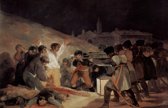

Contemporary history. 19th century vocabulary. María Cristina me quiere gobernar. MARIA CRISTINA - CANTINFLAS(1950) Why is the 2nd May holiday in the Comunidad de Madrid? Dos de Mayo Uprising - Wikipedia. The Dos de Mayo of 1808, was a rebellion by the people of Madrid against the occupation of the city by French troops, provoking the repression by the French Imperial forces and triggering the Peninsular War. Background[edit] The city had been under the occupation of Napoleon's army since 23 March of the same year. King Charles IV had been forced to abdicate in favour of his son Ferdinand VII, and at the time of the uprising both were in the French city of Bayonne at the insistence of Napoleon.
An attempt by the French general Joachim Murat to move the daughter and youngest son of Charles IV to Bayonne led to a popular rebellion that was harshly suppressed by French troops after hours of fierce street fighting. Beginning of the uprising[edit] The spark that provoked the rebellion was the move by the French Marshal in command of Madrid, Joachim Murat, to send the daughter of Charles IV and the Infante Francisco de Paula to the French city of Bayonne. Impact of the uprising[edit] Notes[edit]
Spanish–American War - Wikipedia. The main issue was Cuban independence. Revolts had been occurring for some years in Cuba against Spanish rule. The US later backed these revolts upon entering the Spanish–American War. There had been war scares before, as in the Virginius Affair in 1873, but in the late 1890s, US public opinion was agitated by anti-Spanish propaganda led by newspaper publishers such as Joseph Pulitzer and William Randolph Hearst which used yellow journalism to call for war.[15][16] The business community across the United States had just recovered from a deep depression and feared that a war would reverse the gains. It lobbied vigorously against going to war. President McKinley signed a joint Congressional resolution demanding Spanish withdrawal and authorizing the President to use military force to help Cuba gain independence on April 20, 1898.[17] In response, Spain severed diplomatic relations with the United States on April 21. The ten-week war was fought in both the Caribbean and the Pacific.
Guam. Constitución española de 1812. La Constitución Política de la Monarquía Española, más conocida como Constitución española de 1812 o Constitución de Cádiz,[2] conocida popularmente como la Pepa,[3][nota 1] fue promulgada por las Cortes Generales españolas reunidas extraordinariamente en Cádiz el 19 de marzo de 1812. Se le ha otorgado una gran importancia histórica por tratarse de la primera Constitución promulgada en España,[nota 2] además de ser una de las más liberales de su tiempo. Oficialmente estuvo en vigor solo dos años, desde su promulgación hasta su derogación en Valencia el 4 de mayo de 1814, tras el regreso a España del borbón Fernando VII.[5] Posteriormente se volvió a aplicar desde el 8 de marzo de 1820, cuando en Madrid (España), Fernando VII es obligado a jurar la Constitución española de 1812, estando vigente durante el Trienio Liberal (1820-1823), así como durante un breve período en 1836-1837, bajo el gobierno progresista que preparaba la Constitución de 1837.
Historia[editar] Notas[editar] 18 The Industrial Revolution. Animation of How a Steam Locomotive's Boiler Works. Contemporary history of Spain. The beginning. Spanish History - History of Spain. The history of Spain. Overview of Spanish History from Romans to actual time, through the Inquistion and Spanish Flag and Art. The history of Spain is one of the most fascinating in the world and Spanish history and culture has helped to shape the modern world into what it is today. Although Spain is a relatively small territory located in southwestern Europe, the history of Spain is of grandeur and is strikingly different from that of the rest of the continent.
The timeline of Spanish history tells the story of a land that has been sought after by many civilizations: the Carthaginians and Romans fought over it, the Arabs conquered it and the Catholic monarchs would recover Spain and convert it into the most powerful empire in the world upon the discovery of America. From this moment forward, Spain’s history reached a period of economic and political decadence which was accompanied by both foreign and civil wars.